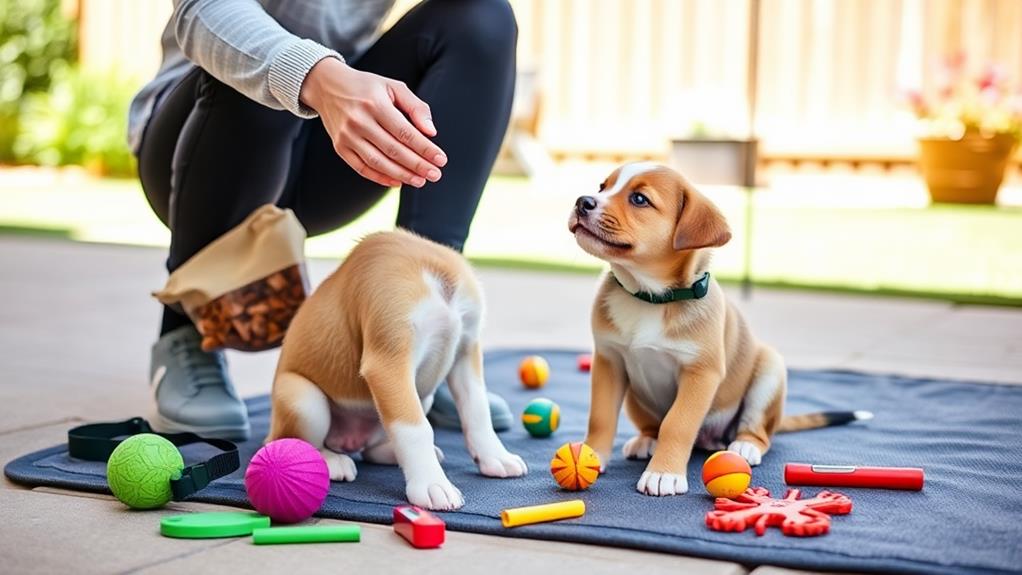Training your puppy is critical for a well-behaved dog. Start with basic commands like "sit" and "stay" to lay a strong foundation. Use positive reinforcement, rewarding good behavior with treats and praise. Establish a consistent routine for meals, potty breaks, and training to help your puppy feel secure. Socialize your pup early by exposing them to different environments and people. Be patient and consistent, knowing setbacks are normal. Encourage good behavior with rewards, and if you face challenges, don't hesitate to seek professional help. Explore these tips further to guarantee you raise a happy, obedient companion.
Start With Basic Commands
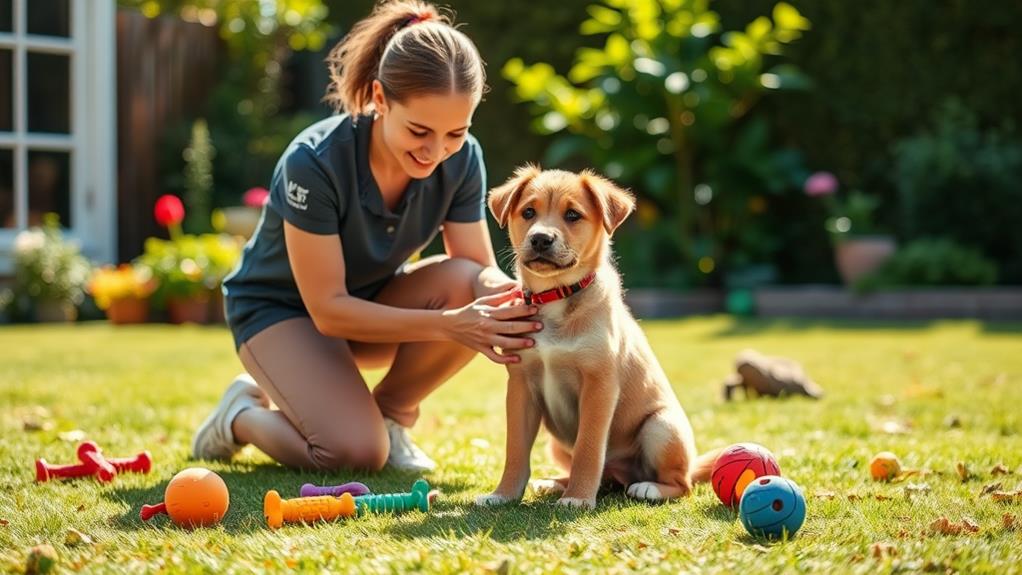
Starting with basic commands is essential for effective puppy training. These commands lay the foundation for your dog's behavior and help establish a strong communication bond between you two. Begin with simple commands like "sit," "stay," and "come." These aren't only easy for your puppy to grasp but also pivotal for their safety and your control.
When teaching these commands, always use clear, consistent cues. For instance, say "sit" firmly while gently pushing your puppy's rear down. Repeat this a few times until they understand what you want. Patience is key; don't rush the process. Puppies learn at different paces, so be prepared to practice regularly without frustration.
Keep training sessions short but frequent, ideally around five to ten minutes each. This keeps your puppy engaged and enthusiastic to learn. Always practice in a distraction-free environment to help your puppy focus on your commands. As they master each command, gradually introduce distractions to test their understanding.
Use Positive Reinforcement
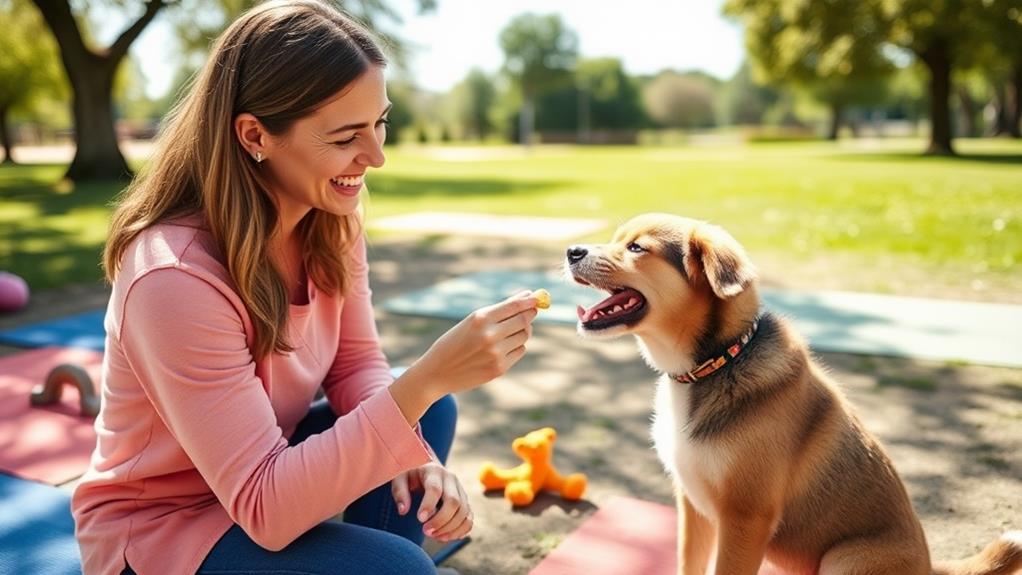
Using positive reinforcement is one of the most effective ways to train your puppy. This technique involves rewarding your puppy immediately after they exhibit the desired behavior. Whether it's sitting on command or going potty outside, using treats, praise, or playtime encourages them to repeat those actions.
Start by choosing high-value treats that your puppy loves. When they perform the command correctly, give them the treat right away, along with enthusiastic praise. This connection helps your puppy understand that good things happen when they obey.
Consistency is key. Always reward the behavior you want to encourage, and avoid punishing them for mistakes. Instead, redirect them to the correct behavior and reward them when they get it right. This approach builds trust and strengthens your bond.
As your puppy learns, gradually reduce the frequency of treats, while still offering praise. This helps your puppy remain motivated without becoming reliant on treats. Remember, training should be a fun and positive experience for both of you, so keep sessions short and engaging. With patience and consistency, you'll foster a well-behaved puppy ready to take on the world!
Establish a Routine
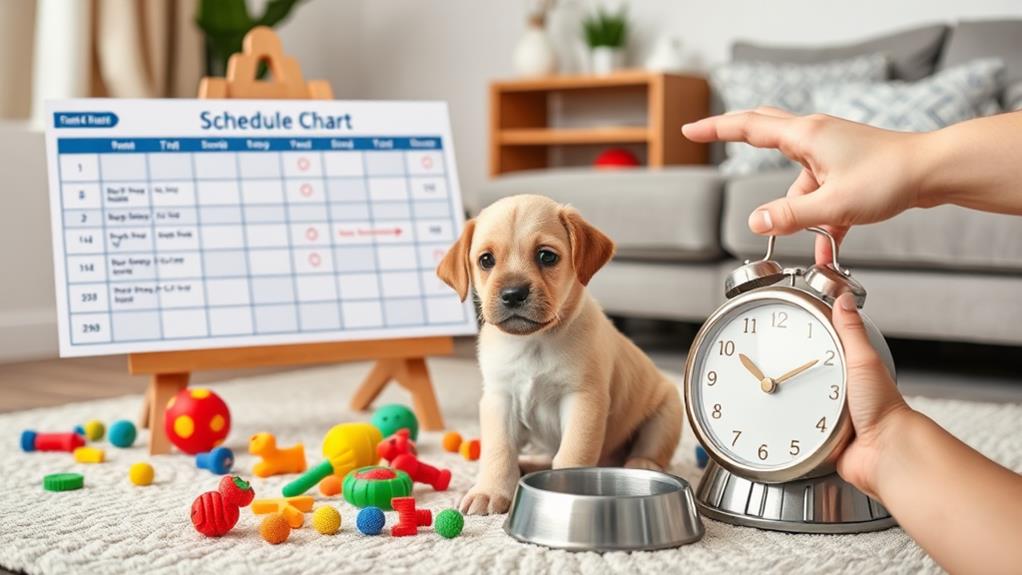
Establishing a routine is pivotal for your puppy's training and development, as it assists them in comprehending what to anticipate throughout the day. A structured schedule helps your puppy feel secure, knowing when to eat, play, and rest.
Start by setting consistent meal times; this not only aids in house training but also regulates their digestion.
Incorporate regular potty breaks into the routine, especially after meals and playtime. This consistency reinforces good habits and minimizes accidents in the house. Make time for daily training sessions, even if they're short. Puppies benefit from frequent, brief interactions that keep them engaged and enthusiastic to learn.
Don't forget to schedule playtime and exercise! This is essential for burning off excess energy, which can prevent undesirable behaviors, such as chewing or barking. Aim for a mix of physical and mental stimulation to keep your puppy happy and balanced.
Socialize Your Puppy
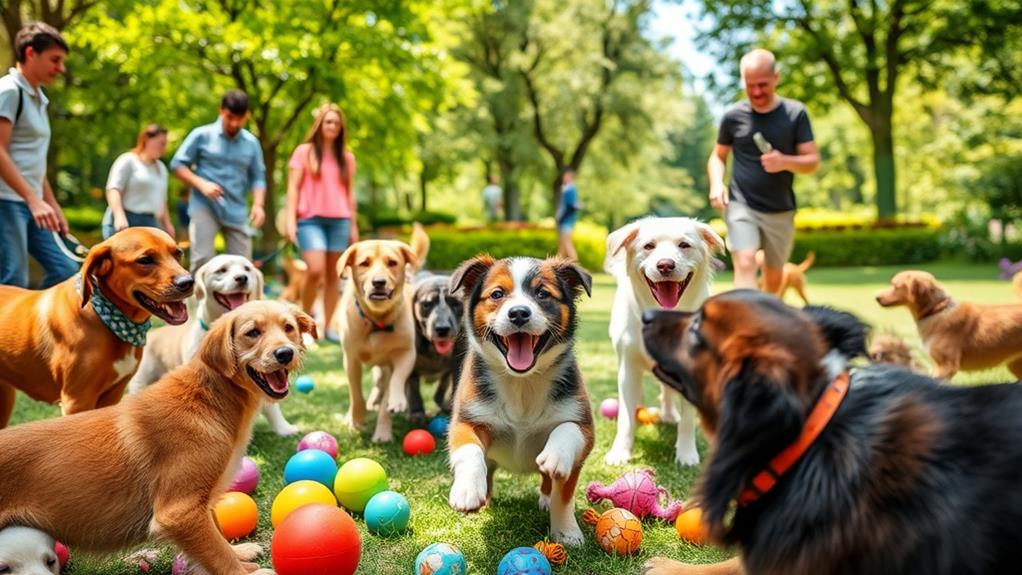
Socializing your puppy is crucial for their development and helps them become a well-adjusted adult dog. Early exposure to various environments, people, and other animals can profoundly influence their behavior and temperament. Start by introducing your puppy to different sounds, sights, and smells in a controlled manner.
Take them for walks in busy areas, visit dog parks, and invite friends over to interact with them. It's essential to expose your puppy to a diverse range of situations. For instance, let them meet people of all ages, different breeds of dogs, and even other pets like cats. Each interaction teaches them how to respond appropriately to new experiences. Make these encounters positive by offering treats and praise when they behave calmly.
Don't forget about the importance of attending puppy classes. These classes not only teach basic obedience but also provide a safe space for your puppy to socialize with others. Remember, the goal is to build your puppy's confidence and help them learn to navigate the world around them. The more positive experiences they've now, the less likely they'll develop behavioral issues later on.
Be Patient and Consistent
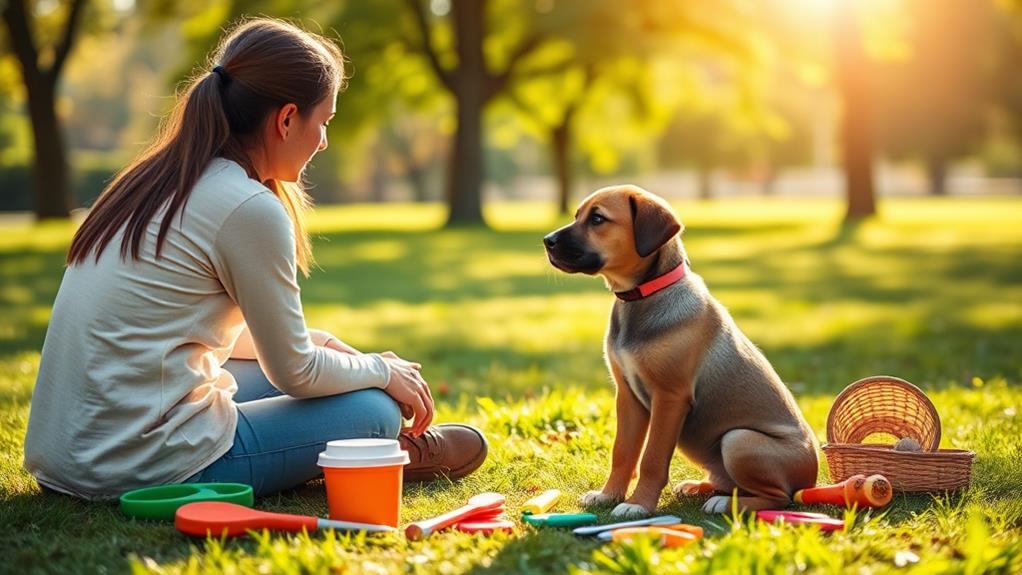
Training your puppy requires a blend of patience and consistency to yield the best results. You might find that your puppy doesn't always grasp commands immediately, and that's perfectly normal. Remember, every pup learns at their own pace. If you get frustrated, your puppy will pick up on that energy, making training less effective.
Set a routine for training sessions. Short, frequent sessions work better than long, drawn-out ones. Aim for 5 to 10 minutes, two to three times a day. During these sessions, use the same commands and cues every time. Consistency helps your puppy understand what you expect from them.
When your puppy makes a mistake, don't lose your cool. Instead, calmly redirect them back to the desired behavior. Reinforce good habits with praise and treats when they get it right. This positive reinforcement will encourage your puppy to repeat those behaviors.
Lastly, be aware that setbacks are a part of the training process. Stay committed and keep practicing. Over time, your patience and consistency will pay off, leading to a well-behaved dog that's a joy to have around. Keep at it, and enjoy the journey!
Encourage Good Behavior
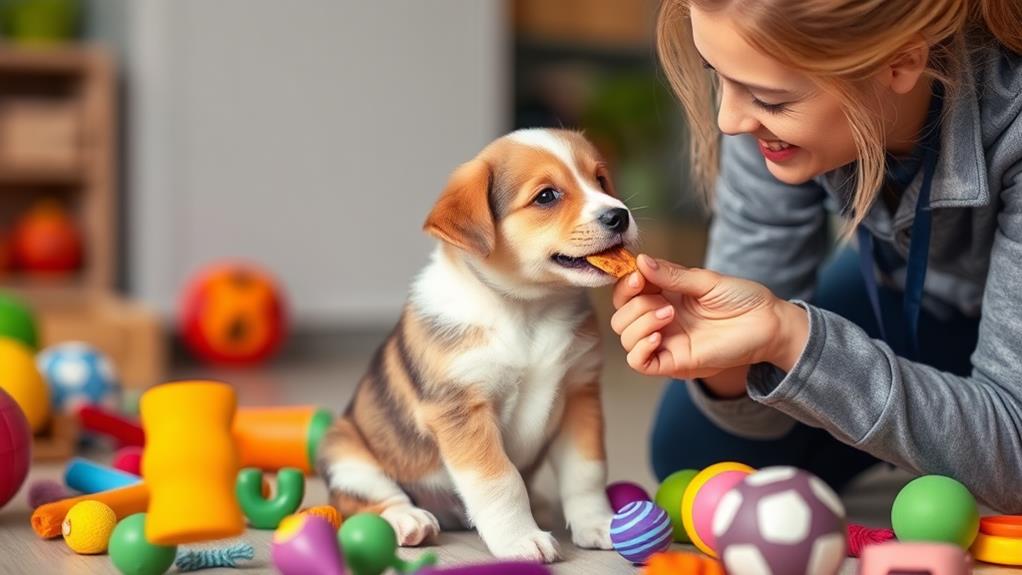
To encourage good behavior in your puppy, focus on rewarding them whenever they do something right. Positive reinforcement is key to shaping your puppy's actions. The more you reward desirable behavior, the more likely your puppy will repeat it.
Here are some effective ways to encourage good behavior:
- Use Treats: Offer small, tasty treats immediately after your puppy performs the desired action. This helps them associate good behavior with positive outcomes.
- Give Praise: Don't underestimate the power of your voice. Use enthusiastic praise, like saying "Good job!" or "Well done!" to reinforce good behavior.
- Incorporate Playtime: Use play as a reward. If your puppy responds well to a command, engage them in a fun game or toss their favorite toy.
- Be Consistent: Always reward the same behavior consistently. This clarity helps your puppy understand what's expected and reinforces their learning.
Seek Professional Help If Needed

Sometimes, despite your best efforts to encourage good behavior, you might find that your puppy is struggling with certain commands or behaviors. If that's the case, it's perfectly okay to seek professional help. Training can be challenging, and some puppies may require guidance from an expert to overcome specific issues.
Professional trainers bring a wealth of experience and knowledge to the table. They can assess your puppy's unique personality and tailor their approach accordingly. Whether it's addressing excessive barking, jumping, or stubbornness, a professional can provide you with effective strategies to tackle these challenges.
Don't hesitate to explore different training options. Group classes can offer socialization opportunities, while private sessions might provide more individualized attention. You might also consider finding a trainer who uses positive reinforcement techniques, as these methods are often the most effective and humane.
Frequently Asked Questions
How Long Does Puppy Training Typically Take?
Puppy training typically takes several weeks to months, depending on the dog's age and your consistency. You'll see progress as you practice daily, so stay patient and committed for the best results.
What Supplies Do I Need for Training?
When it comes to training, you'll need a few essentials to hit the ground running. Grab treats, a clicker, a leash, and a comfortable collar. These tools'll help you train your pup effectively and enjoyably.
Are Certain Breeds Easier to Train Than Others?
Yes, certain breeds are generally easier to train due to their intelligence and enthusiasm to please. Breeds like Border Collies and Poodles often learn commands quickly, while others may require more patience and consistency from you.
Can I Train My Puppy Alone?
Did you know that 89% of dog owners successfully train their pets? Yes, you can train your puppy alone! With patience, consistency, and positive reinforcement, you can build a strong bond and achieve great results.
What Should I Do if My Puppy Is Fearful?
If your puppy's fearful, stay calm and patient. Create a safe space, use gentle encouragement, and avoid forcing interactions. Gradually expose them to new experiences, rewarding their bravery to build confidence over time.
Conclusion
By weaving these training tips into your daily life, you're crafting a strong bond with your puppy, like a gardener nurturing a young plant. With patience and consistency, you'll watch your pup blossom into a well-behaved companion. Remember, every small step counts, and soon enough, you'll be enjoying the fruits of your labor—a happy, obedient dog by your side, ready to share countless adventures. So, roll up your sleeves and start this rewarding journey together!

